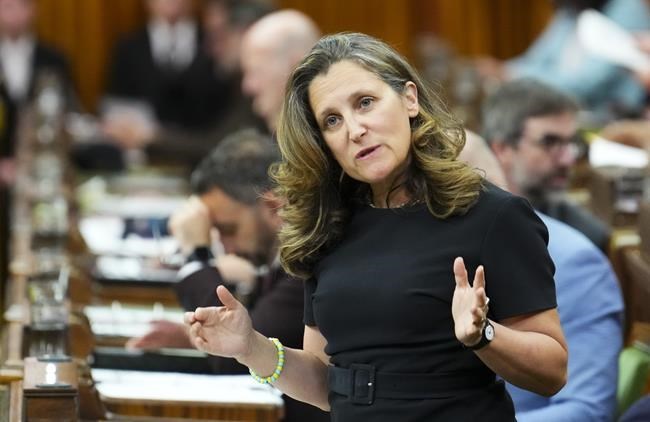TORONTO — Deputy Prime Minister Chrystia Freeland says the uptake of a new savings account for first-time homebuyers is exceeding expectation, though she acknowledged the limits of what it can do to address affordability.
Speaking after meeting with constituents in Toronto who want to buy a home, Freeland said the First Home Savings Account is just one tool to help people get into the market.
“It is not going to solve all of their problems, I am not claiming that, but it’s a little bit of help.”
The tax-free First Home Savings Account, which launched in April with a $8,000 per year and total contribution limit of $40,000, is currently available at seven financial institutions.
Questrade Inc. had its account ready for the April 1 launch, while Wealthsimple also recently began offering the option, including to the nearly 20,000 Canadians who were on their wait-list.
RBC, which launched its program in April, says clients have opened “tens of thousands” of accounts since then, with just over a quarter of them already at the maximum annual amount.
The bank says that 56 per cent of account holders are between 25 and 34 years old, 20 per cent are 35 to 44, and six per cent are over 45.
National Bank also has its FHSA offering up and running, while the remaining Big Six banks say theirs will be ready later this summer or into the fall.
Critics have said the savings account will further increase demand — and home prices — while doing little to improve affordability.
Freeland said she heard from the young people she spoke with about their housing challenges, and that much more will need to be done across levels of government to tackle the issue.
“What they really were saying is this is a crisis, and this is an intergenerational crisis, and I really recognize that," she said. "I really believe that it is important for us at the federal level, the provincial level, the municipal level, to put forward all the tools we can to resolve this crisis.”
She said that she and the Prime Minister are "laser-focused" on getting more homes built to help address the problem.
There are however a daunting number of barriers to increasing the pace of homebuilding, from permitting to inflation, while the Canadian Mortgage and Housing Corp. has forecast that the country needs 3.5 million more homes by 2030 than the country is currently on track to build.
With the speed of homebuilding not matching population growth, economists at both National Bank and TD Bank warned last week that the high levels of newcomers to Canada threaten to make the housing affordability crisis worse.
TD chief economist Beata Caranci said that the current high-growth immigration strategy could widen the housing shortfall by about a half-million units within two years, noting that policymakers have to consider both growth and capacity.
"Policy needs to strike a balance with sustainable growth, lest we tip into the drink," she said.
National Bank economist Stéfane Marion said in a note that opening the "immigration floodgates" has created a record imbalance between housing supply and demand that threatens a "housing affordability Armageddon," and that the federal government should reconsider its targets to allow supply to catch up with demand.
Freeland said that while the government is focused on building more supply to address the crisis, it's also important to keep expanding the country.
"I think it's a really good thing that the Canadian economy is growing, and that Canada's population is growing."
This report by The Canadian Press was first published Aug. 10, 2023.
Ian Bickis, The Canadian Press



